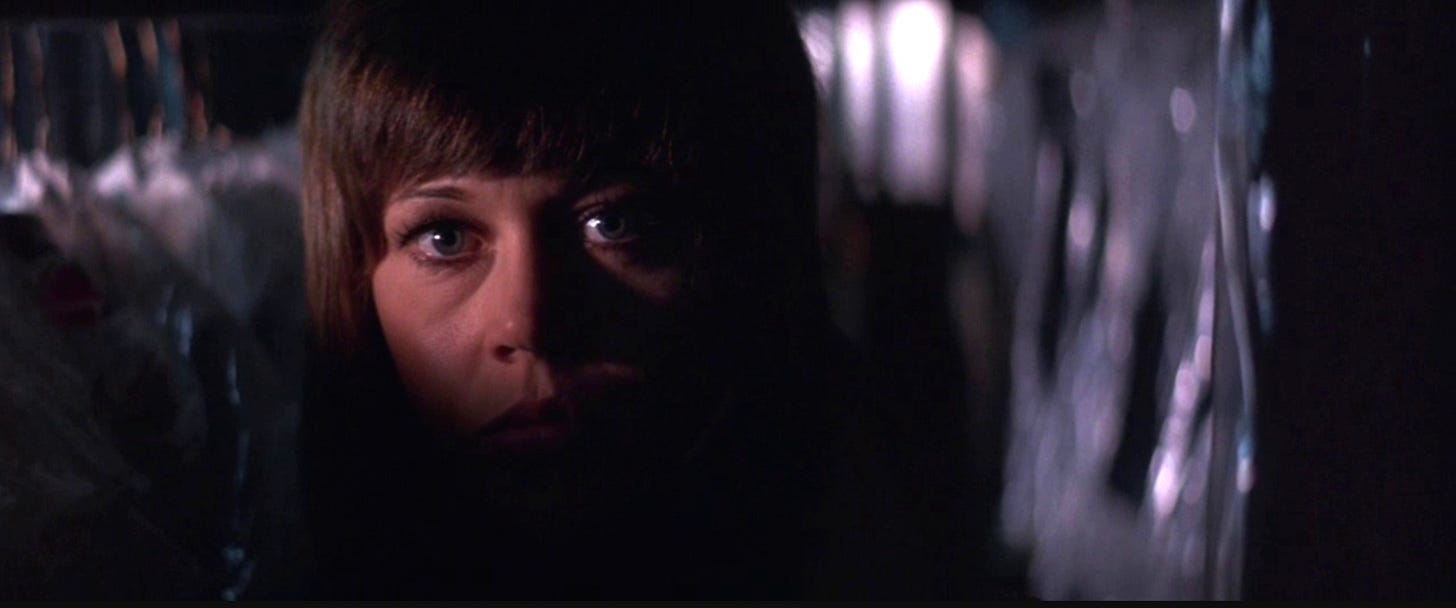Klute
Paranoia for contemporary times
Quick note: You may have noticed that, for the first time since we started three years ago, Movie Night missed a week! That’s because my wife and I recently welcomed our first child! Yay for being tired! Movie Night recommendations will continue, but the pace may vary a bit going forward as we navigate this exciting new chapter of our lives. Thank you for taking a few minutes every week to read some thoughts on movies: it’s a joy to think through what makes a movie work (or not) and share with you. Cheers to you and to hopeful future film revelations!
When is a thriller not about who committed the crime but about who’s being watched as a result? Klute (1971) opens not with violence but with absence: a man gone missing, a phone call cut short, and a young woman’s name, Bree Daniels (Jane Fonda), scribbled in a notebook. What follows is a slow descent into the murky space between performance and paranoia, a film that’s as much about being looked at as it is about looking back. It’s a movie that feels shockingly obscure, given the pedigree of the director and the stars involved.
Alan J. Pakula, who would go on to direct The Parallax View (1974) and All the President’s Men (1976), lays out a sketch of an obsession he would later perfect: the feeling that someone (someone powerful?) is always watching and that the truth, however close, will stay hidden in the shadows. His camera lingers in the dark, behind glass or through wire mesh, until you feel complicit in the surveillance. You can feel the paranoia tightening, not like the sudden fear of a modern thriller, but as a constant hum, a quiet dread that permeates each well-defined room within the film.
Jane Fonda is what gives Klute its pulse. Her Bree is both an object of desire and a subject of her own becoming, a woman whose livelihood depends on performance but whose interior life is what the movie truly wants us to see. Fonda won an Oscar for this role, and rightly so: she plays Bree with a rare mixture of confidence and exposure, a woman who is honest with her psychiatrist and dishonest with the men who pay her. It’s surprising in its portrayal of psychiatry working exactly as it should; 70s films, for good reason, are rife with anti-heroes and societal mistrust: an institution like psychiatry depicted in such a straightforward manner feels subversive. Bree’s voice trembles when she’s with men, but her eyes never stop calculating. Watching Bree means watching someone watch themselves.
Donald Sutherland’s John Klute is almost a negative space in the film, a quiet, stoic investigator whose presence seems to amplify Bree’s contradictions. He is the one searching for the missing man, but it is Bree who is missing from herself. The title may bear his name, but the movie belongs to her: a film about a woman performing under constant observation, both by men and by the camera that refuses to let her hide.
There is a voyeuristic rhythm to Klute that makes it feel both deeply 1970s and startlingly modern. The city hums with loneliness: an unlit apartment, a reel-to-reel tape turning slowly, the sound of a voice played back too loud. Pakula and cinematographer Gordon Willis, nicknamed the “Prince of Darkness,” built a world of muffled menace where each shadow feels like a secret. You can see the DNA of later films such as Taxi Driver (1976), Blue Velvet (1986), and Zodiac (2007) in the way Klute uses urban isolation as both mood and metaphor.
At its heart, Klute is a film about control: who has it, who pretends to, and what it costs to keep performing under someone else’s gaze. Bree wants to be free: to quit sex work, to become an actress, to choose her own roles. But she is caught in a loop where desire and danger blur. Pakula’s camera captures that tension perfectly, turning even the simplest apartment scene into a battle between exposure and retreat.
What makes the film so enduring is not just its mystery but the way it stages a conversation between intimacy and fear. The surveillance is not just technological: it is emotional. Everyone in Klute is recording, replaying, interpreting. Everyone wants proof of something that can’t be captured.
When Bree tells her therapist, “I wish I could be anonymous,” you feel the entire decade collapsing into that single line. It is a wish that no one, especially in the age of microphones and memory, ever really gets. The paranoia of its time reverberates today.
Klute
Written by Andy Lewis and Dave Lewis; Directed by Alan J. Pakula
1971
114 minutes
English
Recommended way to watch (at time of publication): Streaming on Criterion Channel.
You’ll like this if you like: The Parallax View (1974), Taxi Driver (1976), Zodiac (2007)

